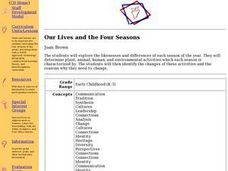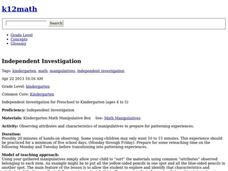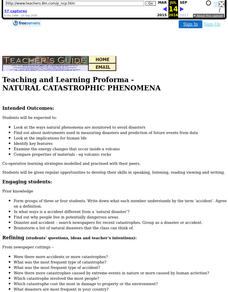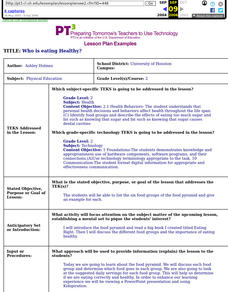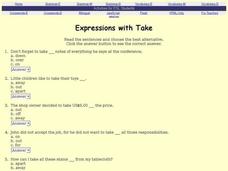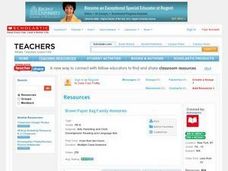Curated OER
Write Your Own Folk or Fairy Tale
Young scholars analyze folk and fairy tales. In this language arts lesson, students discuss the elements of a tale determining what the differences are between folk and fairy tales. Young scholars then write their own tales using the...
Curated OER
Using the Tools in Your Community
Third graders research a profession in their community that uses tools to help the community. In this professions lesson plan, 3rd graders complete computer research to research the profession and present it to the class.
Curated OER
WHERE DO BEARS LIVE?
Students practice making predictions about what happen in the story by looking at the pictures and answering questions aloud. Given a blank sheet of paper and writing utensils, students draw a picture of a bear in a den and describe that...
Curated OER
Amphibians
Fourth graders Make flashcards for the following words, memorize them and get quizzed by the teacher: Amphibian, Lungs, complete metamorphosis, tadpoles, tail-less, tail, vertebrate, cold-blooded, gills, swamp, pond.
Curated OER
Life Cycle of a Butterfly/ Moth
Young scholars explore the life cycle of butterflies, illustrate the life cycle of the butterfly, and compare the researched facts to stories written by Eric Carle about caterpillars and butterflies.
Curated OER
Our Lives and the Four Seasons
Students compare and contrast the four seasons. Using this information, they determine the plant, animal and environmental activities that can be enjoyed in each season. They discuss why the seasons must change and how humans adapt to them.
Curated OER
Independent Investigation
Students classify objects. In this math lesson, students sort and classify objects based on their characteristics. Students identify characteristics of objects.
Curated OER
Natural Catastrophic Phenomena
Sixth graders examine the ways natural phenomena are monitored to avoid disasters. They find out about instruments used in measuring disasters and prediction of future events from data.
Curated OER
Who Is Eating Healthy?
Second graders list the six food groups of the food pyramid and give an example for each. They discuss each food group and determine which food goes in each group. They examine the suggested daily servings for each food group and view a...
Curated OER
Swish, Swish, Swish
Students identify the digraph /sh/ in written and spoken language. After a brief discussion of the independent and combined sounds of the phonemes /s/ and /h/ students practice identifying initial and final placement of the new digraph...
Curated OER
Expressions With Take
In this phrasal verbs learning exercise, learners complete a 10 question multiple choice on-line interactive exercise about the meaning of verbs with "take".
Curated OER
Earth Day Theme Activities
Students make recycled animals. In this Earth Day lesson, students use recycled materials to create artistic animals. A game, a song, a craft, and a recipe are all included with the lesson.
Curated OER
Countries of Africa
Students study the coutries of Africa. In this African American history, small groups of students research a different country, color the country on the map of Africa, write a paragraph about the country, and draw pictures of its flag.
Curated OER
Brown Paper Bag Family Memories
Students collect a variety of objects that represent a family memories. The objects are and the variety of family experiences that they represent are shared with their classmates. Speaking, drawing, and writing activities ar4 developed...
Curated OER
Itchy Ritchy
Itchy Ritchy can help your learners remember the /i/ sound! First teach young learners the fun tongue twister illustrating the target sound, and have them identify the target sound in other words. Use the reading Tim and the Top to...
Curated OER
Getting the Story
Students examine and discuss the basic elements of a newspaper article. They listen to articles, discuss the 'inverted pyramid' style of a breaking news article, and list imaginary current events based on mythological characters.
Curated OER
Who Takes Care of the Maya Forest Corridor?
First graders explore the work of conservationists and how they make sure animals and people are safe in their habitats. They identify the rules, laws, jobs, and people who help them feel safe and keep them healthy. Students explore who...
Curated OER
The Nez Perce War
A lesson which combines the skills of notetaking with a history of the Nez Perce War against the United States Cavalry is here for you. Learners take notes while their instructor lectures them on the information. A quiz is given as a...
Curated OER
Area
Third graders find areas of rectangles by using square units, apply knowledge to real-life situations, and simplify method of counting square units by multiplying the length times the width.
Curated OER
Vocab-u-lous! Build a Fabulous Vocab: Words Beginning with SL
In this vocabulary worksheet, students select the best word to complete the sentence. They are challenged by the difficult words that contain a sl-blend.
Curated OER
Finding Circumference and Area of a Circle
Young geometers explore the concept of circumference and area of circles. They discuss what information is needed to find circumference and area. The resource employs several instructional methods: Frayer Model for Vocabulary, literature...
Curated OER
Not So Much a Lesson, More a Song and Dance
Inspired by Britain's National Poetry Day, this resource will help your class analyze poetry. You will find a variety of poetry analysis methods to work through with your class. Finish by having each person compose an original poem.
Curated OER
Washington D. C.
As a brief overview of Washington D.C. and famous landmarks, this resource could be used as a supplement to a social studies unit. The presentation refers to President Bush, but could be altered to include information about the current...








